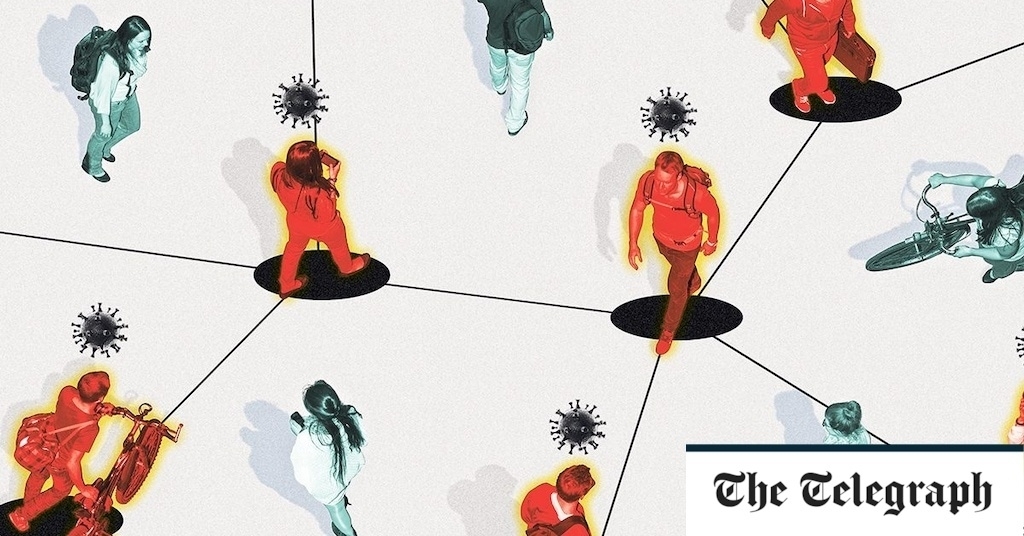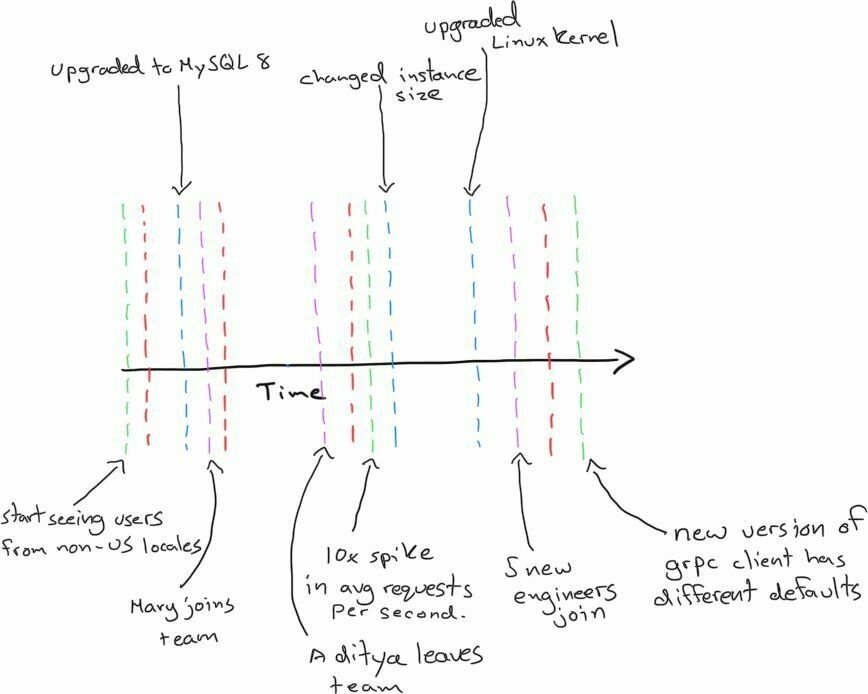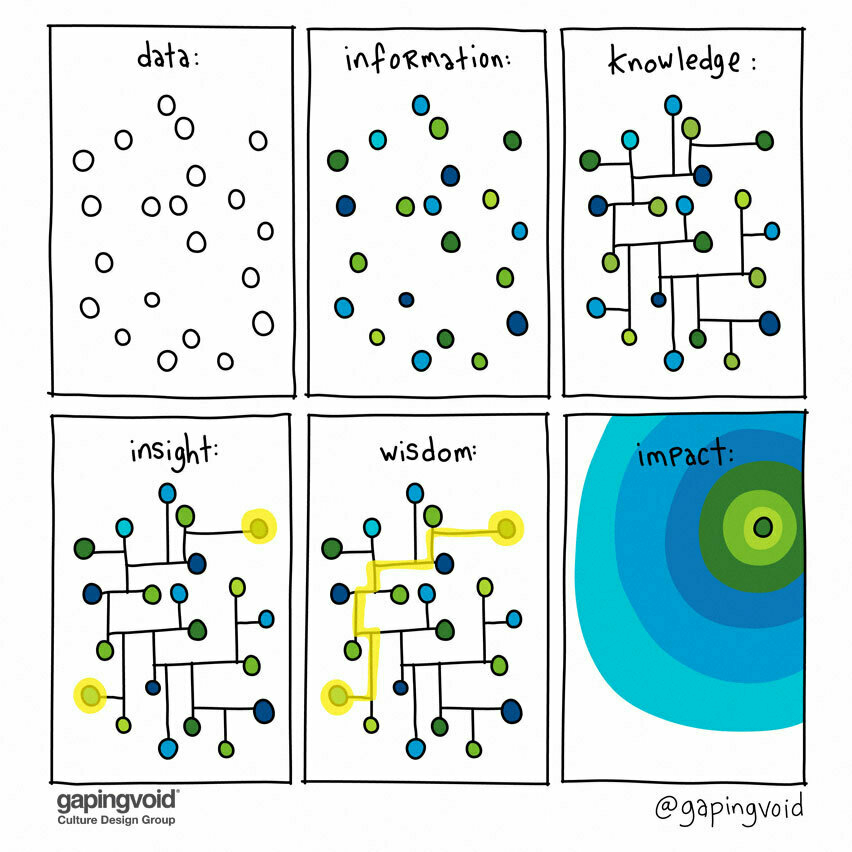- We should accept the premise that people will not run their own servers by designing systems that can distribute trust without having to distribute infrastructure. This means architecture that anticipates and accepts the inevitable outcome of relatively centralized client/server relationships, but uses cryptography (rather than infrastructure) to distribute trust. One of the surprising things to me about web3, despite being built on “crypto,” is how little cryptography seems to be involved!
- We should try to reduce the burden of building software. At this point, software projects require an enormous amount of human effort. Even relatively simple apps require a group of people to sit in front of a computer for eight hours a day, every day, forever. This wasn’t always the case, and there was a time when 50 people working on a software project wasn’t considered a “small team.” As long as software requires such concerted energy and so much highly specialized human focus, I think it will have the tendency to serve the interests of the people sitting in that room every day rather than what we may consider our broader goals. I think changing our relationship to technology will probably require making software easier to create, but in my lifetime I’ve seen the opposite come to pass. Unfortunately, I think distributed systems have a tendency to exacerbate this trend by making things more complicated and more difficult, not less complicated and less difficult.
Meetings and work theatre
The way that you do something is almost as important as what you do. However, I’ve definitely noticed that, during the pandemic as people get used to working remotely (as I’ve done for a decade now) there’s definitely been some, let’s say, ‘theatre’ added to it all.
Meetings, the office’s answer to the theatre, have proliferated. They are harder to avoid now that invitations must be responded to and diaries are public. Even if you don’t say anything, cameras make meetings into a miming performance: an attentive expression and occasional nodding now count as a form of work. The chat function is a new way to project yourself. Satya Nadella, the boss of Microsoft, says that comments in chat help him to meet colleagues he would not otherwise hear from. Maybe so, but that is an irresistible incentive to pose questions that do not need answering and offer observations that are not worth making.Source: The rise of performative work | The EconomistShared documents and messaging channels are also playgrounds of performativity. Colleagues can leave public comments in documents, and in the process notify their authors that something approximating work has been done. They can start new channels and invite anyone in; when no one uses them, they can archive them again and appear efficient. By assigning tasks to people or tagging them in a conversation, they can cast long shadows of faux-industriousness. It is telling that one recent research study found that members of high-performing teams are more likely to speak to each other on the phone, the very opposite of public communication.
Performative celebration is another hallmark of the pandemic. Once one person has reacted to a message with a clapping emoji, others are likely to join in until a virtual ovation is under way. At least emojis are fun. The arrival of a round-robin email announcing a promotion is as welcome as a rifle shot in an avalanche zone. Someone responds with congratulations, and then another recipient adds their own well wishes. As more people pile in, pressure builds on the non-responders to reply as well. Within minutes colleagues are telling someone they have never met in person how richly they deserve their new job.
Vaccine Hesitancy as part of a Plague Anthology
I’m not sure who’s behind this website, but it looks good. I appreciated the historical context behind vaccine hesitancy in cultures other than my own provided in the most recent post.
Anti-vaxxers adjacent to conspiracy theorists are nuts, but there’s definitely a communications angle to ensuring the effective roll-out of life-saving vaccines.
In Egypt, around 1800, there are reports of 60 000 deaths each year. The Ottoman ruler, Muhammad Ali Pasha, began in 1819 to institute a plan for general vaccinations and the logical people to carry this out were the barber-surgeons, known and trusted by the locals. While the Bedouin had long been enthusiastic about protecting their children in this way, the fellahin (peasantry) was reluctant, largely because they did not trust the government and thought it was a way of “marking” their children for conscription. Religious objections and concerns about mixing Muslim and Christian blood also played their part, and attempts to bribe the vaccinators were not uncommon.Source: Vaccine Hesitancy – Egypt 1866 | Plague AnthologyAfter the serious epidemic of 1836, official efforts intensified, with barber-vaccinators being trained and records kept. Gradually, the message got through and by 1850, the decline in child mortality was affecting the population statistics. The following anecdote, describes a perhaps surprising pocket of vaccine hesitancy.
Let's Settle This
This is good fun and, in fact, Laura and I used it to structure the upcoming Season 3 trailer for our podcast.
It's time to settle the endless internet debates.Source: Let's Settle This
Signal's CEO on 'web3'
My first response to most new technological things is usually “cool, I wonder how I/we could use that?” With so-called ‘web3’, though, I’ve kind of thought it was bullshit.
This post by Moxie Marlinspike, CEO of Signal, goes a step forward and includes opinions by someone who actually knows what they’re talking about.
I’m not sure what I think about the bit quoted below about not distributing infrastructure? In Marxist terms, it seems like not distributing or providing ownership of the means of production?
If we do want to change our relationship to technology, I think we’d have to do it intentionally. My basic thoughts are roughly:Source: Moxie Marlinspike >> Blog >> My first impressions of web3
Update: Moxie Marlinspike has announced he’s stepping down as Signal CEO.
Pessimism of the intellect, optimism of the will.
Someone I once knew well used to cite Gramsci’s famous quotation: “Pessimism of the intellect, optimism of the will.” I’m having to channel that as I look forward to 2022.
Here’s the well-informed writer Charlie Stross on the ways he sees things panning out.
Climate: we're boned. Quite possibly the Antarctic ice shelves will be destablized decades ahead of schedule, leading to gradual but inexorable sea levels rising around the world. This may paradoxically trigger an economic boom in construction—both of coastal defenses and of new inland waterways and ports. But the dismal prospect is that we may begin experiencing so many heat emergencies that we destabilize agriculture. The C3 photosynthesis pathway doesn't work at temperatures over 40 degrees celsius. The C4 pathway is a bit more robust, but not as many crops make use of it. Genetic engineering of hardy, thermotolerant cultivars may buy us some time, but it's not going to help if events like the recent Colorado wildfires become common.Source: Oh, 2022! | Charlie’s DiaryPolitics: we’re boned there, too. Frightened people are cautious people, and they don’t like taking in refugees. We currently see a wave of extreme right-wing demagogues in power in various nations, and increasingly harsh immigration laws all round. I can’t help thinking that this is the ruling kleptocracy battening down the hatches and preparing to fend off the inevitable mass migrations they expect when changing sea levels inundate low-lying coastal nations like Bangladesh. The klept built their wealth on iron and coal, then oil: they invested in real estate, inflated asset bubble after asset bubble, drove real estate prices and job security out of reach of anyone aged under 50, and now they’d like to lock in their status by freezing social mobility. The result is a grim dystopia for the young—and by “young” I mean anyone who isn’t aged, or born with a trust fund—and denial of the changing climate is a touchstone. The propaganda of the Koch network and the Mercer soft money has corrupted political discourse in the US, and increasingly the west in general. Australia and the UK have their own turbulent billionaires manipulating the political process.
Laptops aren't what they used to be
This guy went back to using a Lenovo ThinkPad T430 and explains why in this post. Over Christmas, I replaced some of the cosmetic parts of my X220, which is also from 2012.
It’s amazing how usable it still is, and I actively prefer the keyboard over the more modern ones.
I’ve been using this setup for over a month now, and it has been surprisingly adequate. Yes, opening Java projects in IntelliJ will make things slow, and to record my desktop with OBS and acceptable performance, I had to drop my screen resolution to 720p. I can’t expect everything to work super well on this machine, but for a computer that’s released almost 10 years ago, it’s still holding up well.Source: Why I went back to using a ThinkPad from 2012I’d like to thank Intel here for making this possible. The CPU innovation stagnation between 2012-2017 has resulted in 4 cores still being an acceptable low-end CPU in early 2022. Without this, my laptop would likely be obsolete by now.
Somebody please tell the travel industry there's a climate emergency
Utter madness.
German giant Lufthansa said it would have to fly an additional 18,000 “unnecessary” flights through the winter to hold on to landing slots. Even if the holidays brought a big increase in passengers — marked by thousands of flight cancellations that left travelers stranded — the rest of the winter period could be slow as omicron surges worldwide.Source: Near-empty flights crisscross Europe to secure landing slots | AP NewsLanding and departure slots for popular routes in the biggest airports are an extremely precious commodity in the industry, and to keep them, airlines have to guarantee a high percentage of flights. It is why loss-making flights have to be maintained to ensure companies keep their slots.
It was an accepted practice despite the pollution concerns, but the pandemic slump in flying put that in question. Normally, airlines had to use 80% of their given slots to preserve their rights, but the EU has cut that to 50% to ensure as few empty or near-empty planes crisscross the sky as possible.
Covid immunity and medical breakthroughs
It seems like we’re learning a lot in a very short space of time about viruses and immunity. Happily, this might lead to breakthroughs in all sorts of areas.
We tend to think of immunity as something of an absolute – either we’re immune to a virus, or we’re not. But that hides a world of complications, says Danny Altmann, professor of medicine and immunology at Imperial College London. The genes that control our immunity are among the most diverse in the human body, he says, differing hugely from person to person.Source: Why some people keep getting Covid – and others never at all | The Telegraph[…]
But what explains this natural immunity? The most likely theory is that these people’s immune systems have already been exposed to similar viruses, years or decades earlier. Sars-Cov-2 is one of a family of seven human coronaviruses, most of which cause the common cold. All of these viruses look fairly similar. When your T-cells learn how to fight one, they get better at fighting them all, it is thought.
Another, less well-researched answer lies in our genes. Some people might simply be born with an immunity to certain viruses, scientists suspect.
[…]
If it turns out that some people are indeed naturally immune to Covid, it’s wonderful news for them. But it might also help the rest of us, speeding up development of a pan-coronavirus vaccine capable of defeating any variant. The current generation of Covid vaccines were all designed to target the spike protein, on the virus’s outer edge. But the spike protein also changes frequently, each time the virus mutates. This means vaccines are slightly less effective against each new variant.
But natural immunity appears to work differently. In the UCL trial, researchers looked carefully at the blood of those volunteers who seemed to have pre-existing immunity to the virus. Rather than targeting the spike protein, their T-cells were targeting proteins at the centre of the virus. These proteins are much less likely to change from mutation to mutation. In fact, they tend to be found in most coronaviruses, not just Sars-Cov-2. If a vaccine could be built to target these inner proteins, it might just be able to defeat all variants – as well as a range of other coronaviruses.
Jam tomorrow
The key to success traditionally has been to play the long game. If the system is rigged in your favour, that works. If it's not, then it's always "jam tomorrow".

Where does the idea that we can achieve, or should even be aiming for, endless productivity come from? Arguably we’ve been barrelling towards this conclusion for as long as capitalism has existed, but the technological advances of the past few decades have further eroded the barriers around work that stop it seeping into every aspect of our lives. There is a widespread cultural fetishisation of productivity, with overwork framed as a virtue by employers desperate to find ways to motivate a workforce for whom the traditional rewards – a decent salary, pension, job security – often no longer apply.Source: This year, I stopped being productive. Why is it so hard to come to terms with that? | The Guardian
Everyone has something to teach
As someone who is apparently in a microgeneration between Generation X and Millennials, I feel constantly the tension between the “old ways” of doing things and the “throwing things against the wall to see what sticks” approach.
This article frames the issue nicely: everyone has something to teach, no matter whether you’re the person with lots of experience to share, or the person with the new approach.
Gaining experience takes time, effort, and often comes at the price of making painful mistakes. You don’t want to let those lessons go. You want them to mean something, to help you from making the same painful mistakes again. To help others from making the same mistakes you made. So it will always be the case that those with the most experience – and the good, smart, accurate wisdom that comes from it – will be the least willing to adapt their views as the world evolves.Source: Experts From A World That No Longer Exists · Collaborative FundNeither should be the case, because every generation cycles through the same process. Today’s older generation once understood the world better than their parents, who scoffed at them. Today’s younger generation will one day be stuck in the antiquated norms of their past, and their kids will scoff at them. I can imagine my son in 80 years screaming, “Get off my metaverse lawn!”
One takeaway from this is that no age has a monopoly on insight, and different levels of experience offer different kinds of lessons. Vishal Khandelwal recently wrote that old guys don’t understand tech, but young guys don’t understand risk. Another way to put it is: everyone has something to teach.
Image: CC BY Tea, two sugars
Ignore the sociotechnics at your peril
This post is focusing on technical teams looking after software. But it can also apply to anything where systems are being developed and/or maintained.
Each set of markers we added to our system provided new context to form assumptions and frame our thinking. Everything in the visualization existed whether we were looking or not. It becomes clear when looked at this way that each of these dimensions is inextricably linked. It’s impossible to think holistically about software without thinking about the operational environment, or the users of the system, or the people involved in building and maintaining it. These things come together to create another lens through which we can view the world.Source: Sociotechnical Lenses into Software Systems | Paul OsmanIt’s important to point out that the final image here is still incomplete. We’ll never fit all of the contexts into a single model. We could keep going, adding more and more context. A fascinating one, for example, would be marking the beginning of the COVID pandemic, when a team that perhaps was colocated started working remotely, and when stress and risk of burnout increased considerably. Otherwise, we’ll eventually include the whole world, but it’s interesting to continually zoom out and see how a new lens helps frame our perspectives.
[…]
Many organizations have adopted the practice of doing “post-mortems” or “retrospectives” after incidents. Retrospectives are great! Unfortunately, I think a lot of learning is left on the table by the adoption of template-driven processes that produce shallow understandings of what transpired. I’ve spoken about how I think we can improve this. There are also experts in the field who provide training and consulting in incident analysis. There are also communities and companies dedicated to helping you improve this practice.
Wealth is a product of luck
This seems obvious to me: that luck plays a great part in success. Well, serendipity, perhaps which can always be given a helping hand by elite networks and pushy parents…
The conventional answer is that we live in a meritocracy in which people are rewarded for their talent, intelligence, effort, and so on. Over time, many people think, this translates into the wealth distribution that we observe, although a healthy dose of luck can play a role.Source: If you’re so smart, why aren’t you rich? Turns out it’s just chance. | MIT Technology ReviewBut there is a problem with this idea: while wealth distribution follows a power law, the distribution of human skills generally follows a normal distribution that is symmetric about an average value. For example, intelligence, as measured by IQ tests, follows this pattern. Average IQ is 100, but nobody has an IQ of 1,000 or 10,000.
The same is true of effort, as measured by hours worked. Some people work more hours than average and some work less, but nobody works a billion times more hours than anybody else.
And yet when it comes to the rewards for this work, some people do have billions of times more wealth than other people. What’s more, numerous studies have shown that the wealthiest people are generally not the most talented by other measures.
What factors, then, determine how individuals become wealthy? Could it be that chance plays a bigger role than anybody expected? And how can these factors, whatever they are, be exploited to make the world a better and fairer place?
Image: CC BY-ND fearthekumquat
Unsolicited advice might not be so bad after all?
I’ve followed Tressie McMillan Cottom on Twitter ever since she did a keynote for ALT a few years ago. In this article for The New York Times, she talks about ‘advice culture’.
Cottom is wonderfully forthright in her interactions on Twitter, so I was expecting her to rail against advice culture. Instead, she talks about it as a form of small talk, and (I suppose) a form of necessary social glue.
In the social media era, advice culture feels bigger and more pervasive than ever. After all, what is social media if not the gamification of advice? Every time we post something on Facebook or Twitter or Instagram, we are implicitly asking others to make a judgment of us. And we find ourselves unable to understand why someone would post or share an experience if not to solicit our evaluation. That is what “likes” and comments and “friending” has done to our brains...Source: Why Everyone Is Always Giving Unsolicited Advice | The New York TimesAdvice culture is so pervasive that it must serve some other function, do something more than assuage insecurities or performing status. Sociologists generally agree that advice is up there with small talk for how it facilitates human connection between strangers. But I recently began thinking advice is no longer a mere subset of small talk but has become our culture’s default common language. Advice is small talk. The decline of social associations like the Rotary Club and the bowling leagues not only weakened our connections to community; it also atrophied our linguistic tool kit.
Peeking around corners with holographic cameras
It's amazing to think that 10 years ago we thought we were only a few years away from fully autonomous vehicles. Even now, we're in the early stages of actually making them safe.
Blind corners have long troubled drivers, but they might not pose such a hazard for much longer. Researchers at Northwestern University have developed a new holographic camera technology that can peer around corners by reconstructing scattered light waves, quickly enough to spot fast-moving objects like cars or pedestrians.
When light strikes an object, it scatters, and some of that finds its way to our retinas, or the sensors of a camera, allowing the object to be seen. Of course, that means we can’t see objects behind other objects, or through scattering media like fog or skin. But there might be a way to use the scattering of light off multiple objects to see around corners.
Position a mirror just right, and you can see objects around corners. Even without a mirror, that principle still holds true – it’s just that the secondary object scatters the light too much for us to reconstruct the target. But an emerging technology called non-line-of-sight (NLoS) imaging can do just that.
NLoS systems work by beaming light out, which bounces off a surface, strikes an object and bounces back to the surface, then back to a sensor. Algorithms can then create an image of the object around a corner. As you might expect however, images reconstructed in this way can often be low resolution, or take too long to process.
Source: Holographic camera reconstructs objects around corners in milliseconds | New Atlas
The impact of a plant-based diet on migraines
Aged 18, I was rejected at the last hurdle from the Royal Air Force for a scholarship which would have paid for my university tuition. The reason? I’d just started suffering from migraines.
There are lots of different types of triggers, but common to all types is stress. That’s not so good if you’re looking to be employed in Fighter Command.
In many ways, I dodged a bullet (literally and metaphorically!) by not joining the RAF, but migraines have been a constant struggle. In the past few years I’ve had a lot fewer of them, something I put down to reducing my stress levels and taking an L-Theanine supplement every day.
However, this article focuses on the benefits of a plant-based diet for migraine sufferers. I stopped eating meat in 2017 and then eliminated fish too, turning vegetarian in January of this year. It looks like that might have been a great idea not only from an animal welfare point of view, but in terms of my own welfare too!
Health experts are calling for more research into diet and migraines after doctors revealed a patient who had suffered severe and debilitating headaches for more than a decade completely eliminated them after adopting a plant-based diet.Source: Man’s severe migraines ‘completely eliminated’ on plant-based diet | Nutrition | The GuardianHe had tried prescribed medication, yoga and meditation, and cut out potential trigger foods in an effort to reduce the severity and frequency of his severe headaches – but nothing worked. The migraines made it almost impossible to perform his job, he said.
But within a month of starting a plant-based diet that included lots of dark-green leafy vegetables, his migraines disappeared. The man has not had a migraine in more than seven years, and cannot remember the last time he had a headache. The case was reported in the journal BMJ Case Reports.
Information is not knowledge (and knowledge is not wisdom)
Some reflections by Nick Milton on why knowledge management within organisations is so poor. If I were him, I would have included the below illustration from gapingvoid as I think it illustrates his five points rather well.
Firstly much of the knowledge of the organisation is never codified as information.Source: Why you can’t solve knowledge problems with information tools alone | Knoco Stories[…]
Secondly, a common problem (a corollary of the first) is that project knowledge may never have been recorded in project documents.
[…]
Thirdly, and a corollary to the first two, the vast majority of project information is not knowledge anyway. If you are relying on project documents as a source of knowledge, you will be relying on a very diluted source - a lot of noise and not much signal.
[…]
Fourthly, if there is codified knowledge in the project documents, it tends to be scattered across many documents and many projects.
[…]
Finally, many of the knowledge problems are cultural. People are incentivised to rush on to the next job rather than to spend time reflecting on lessons, no matter how important.
Start Often Finish rArely
I love this, and along with this post about the joy of watching films in black and white, led to me starting a new art project.
SOFA is the name of a hacker/art collective, and also the name of the principle upon which the club was founded.Source: 🛋 SOFAThe point of SOFA club is to start as many things
as possibleas you have the ability, interest, and capacity to, with no regard or goal whatsoever for finishing those projects.[…]
You can be finished with your project whenever you decide to be done with it. And “done” can mean anything you want it to be. Whose standards of completion or perfection are you holding yourself to anyway? Forget about those! Something is done when you say it is. When it’s no longer interesting. When you’ve gotten a sufficient amount of entertainment and experience from it. When you’ve learned enough from it. Whatever, whenever. Done is what you say it is.
Introspections on timewasting
What I’ve learned over the years from my own experience is that what one person calls a “waste of time” is the complete opposite for someone else. It also has a temporal/timing element to it, as well, I’d argue.
For example, I spent an inordinate amount of time on Twitter between 2007 and 2012, but this paid off massively in terms of my career. I learned a lot and made really valuable connections in the process. My wife thought it was a waste of my time. These days, it absolutely would be.
In this post, the author reflects on why they “waste time” and look at different reasons as well as various ways they’ve sought to combat it. As someone who’s been through therapy, I’d suggest that there’s always something below the surface that needs a skilled professional to draw out.
That’s what seems missing here.
I spend way too much time on reddit, hacker news, twitter, feedly, coinbase, robinhood, email, etc. I’d like to spend time on things that are more meaningful - chess, digital painting, side projects, reading, video games, exercising, meditating, etc. This has been a problem for years.Source: Scattered Thoughts on Why I Waste My Own Time | Just a blogThis post is only slightly adapted from my personal notes, so excuse the lack of structure; I didn’t want to try to twist this jumble of thoughts into a narrative.
Image: CC BY mysza831
Freedom for the few vs. freedom for the many
My wife and I were talking about lockdowns yesterday given that we’re due to be travelling to the Netherlands next month and they’ve announced a partial lockdown. I can’t imagine something similar would be accepted in the UK — by which I mean it would probably be difficult to enforce.
Austria are imposing a nationwide lockdown for unvaccinated people. This sounds like a good solution for those vaccinated, but (a) there’s non-conspiracy reasons why people aren’t vaccinated, and (b) whatever means are used to prove vaccinated will be instantly forged.
It’s a problem, for sure, how to protect the freedoms of everyone.

Austria will impose a nationwide lockdown for people who have not been vaccinated against COVID-19, becoming the first country in the world to do so, Chancellor Alexander Schallenberg announced on Friday.Source: Austria to declare nationwide lockdown for unvaccinated people | BNO News[…]
“A lockdown for the unvaccinated means one cannot leave one’s home unless one is going to work, shopping (for essentials), stretching one’s legs – exactly what we all had to suffer through in 2020,” Schallenberg said earlier, according to Reuters.
The lockdown for the unvaccinated has already been formally approved in Upper Austria, where restrictions have also been announced for the entire population. This includes a legal requirement to wear an FFP2 mask in all indoor public places and a ban on events for 3 weeks.
[…]
However, questions have been raised about the feasibility of a lockdown which applies to only a part of the population. “We don’t live in a police state and we can’t and don’t want to check every street corner,” Schallenberg said.
















